Essay on Restrictive and Defensive Nursing in Mental Health Care
VerifiedAdded on 2023/06/11
|10
|2410
|216
Essay
AI Summary
This essay critically examines restrictive and defensive practices within mental health care, highlighting their negative impacts on both clients and staff. It explores the use of restrictive interventions like restraint and seclusion under the Mental Health Act 2014, emphasizing the need for authorized personnel and the importance of minimizing their use. The essay also discusses defensive nursing practices, differentiating between positive and negative approaches. Furthermore, it proposes alternative management strategies for aggression and violence in inpatient psychiatric settings, such as maintaining calmness, active listening, non-defensive postures, and empathetic communication. The essay concludes with recommendations for improving user service experience, staff training, and reducing the use of restrictive interventions to promote a safer and more therapeutic environment. Desklib offers a platform to access this and many other solved assignments for students.
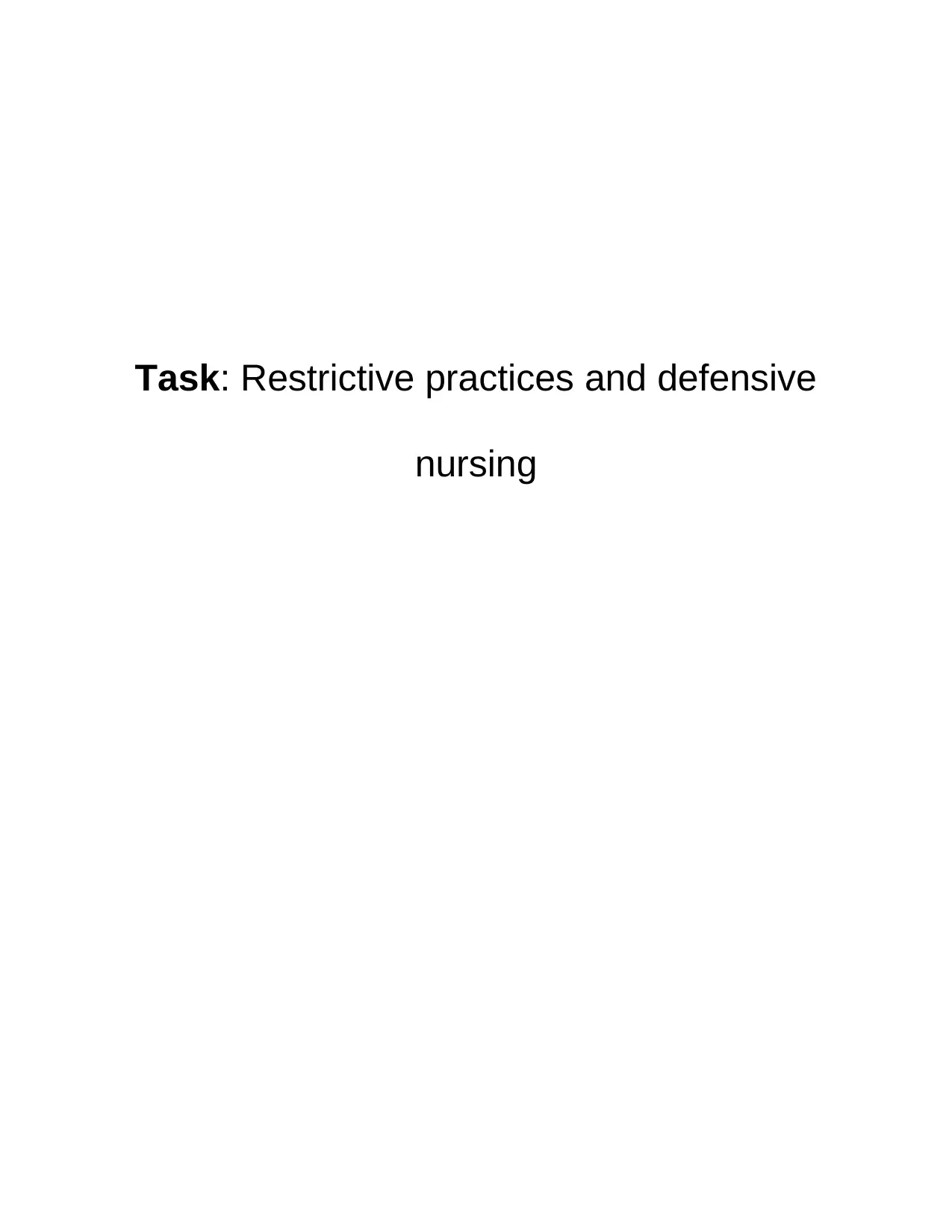
Task: Restrictive practices and defensive
nursing
nursing
Paraphrase This Document
Need a fresh take? Get an instant paraphrase of this document with our AI Paraphraser
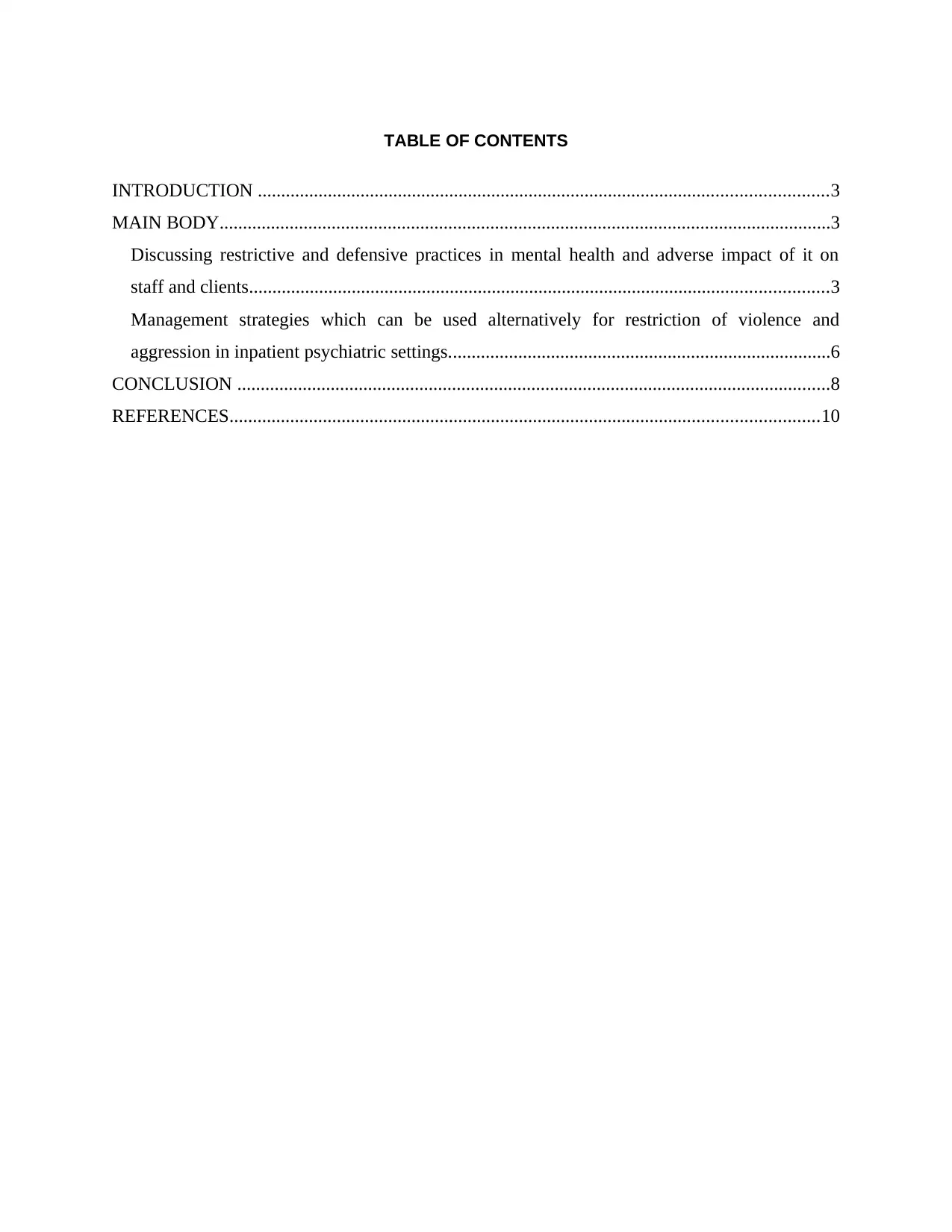
TABLE OF CONTENTS
INTRODUCTION ..........................................................................................................................3
MAIN BODY...................................................................................................................................3
Discussing restrictive and defensive practices in mental health and adverse impact of it on
staff and clients............................................................................................................................3
Management strategies which can be used alternatively for restriction of violence and
aggression in inpatient psychiatric settings..................................................................................6
CONCLUSION ...............................................................................................................................8
REFERENCES..............................................................................................................................10
INTRODUCTION ..........................................................................................................................3
MAIN BODY...................................................................................................................................3
Discussing restrictive and defensive practices in mental health and adverse impact of it on
staff and clients............................................................................................................................3
Management strategies which can be used alternatively for restriction of violence and
aggression in inpatient psychiatric settings..................................................................................6
CONCLUSION ...............................................................................................................................8
REFERENCES..............................................................................................................................10
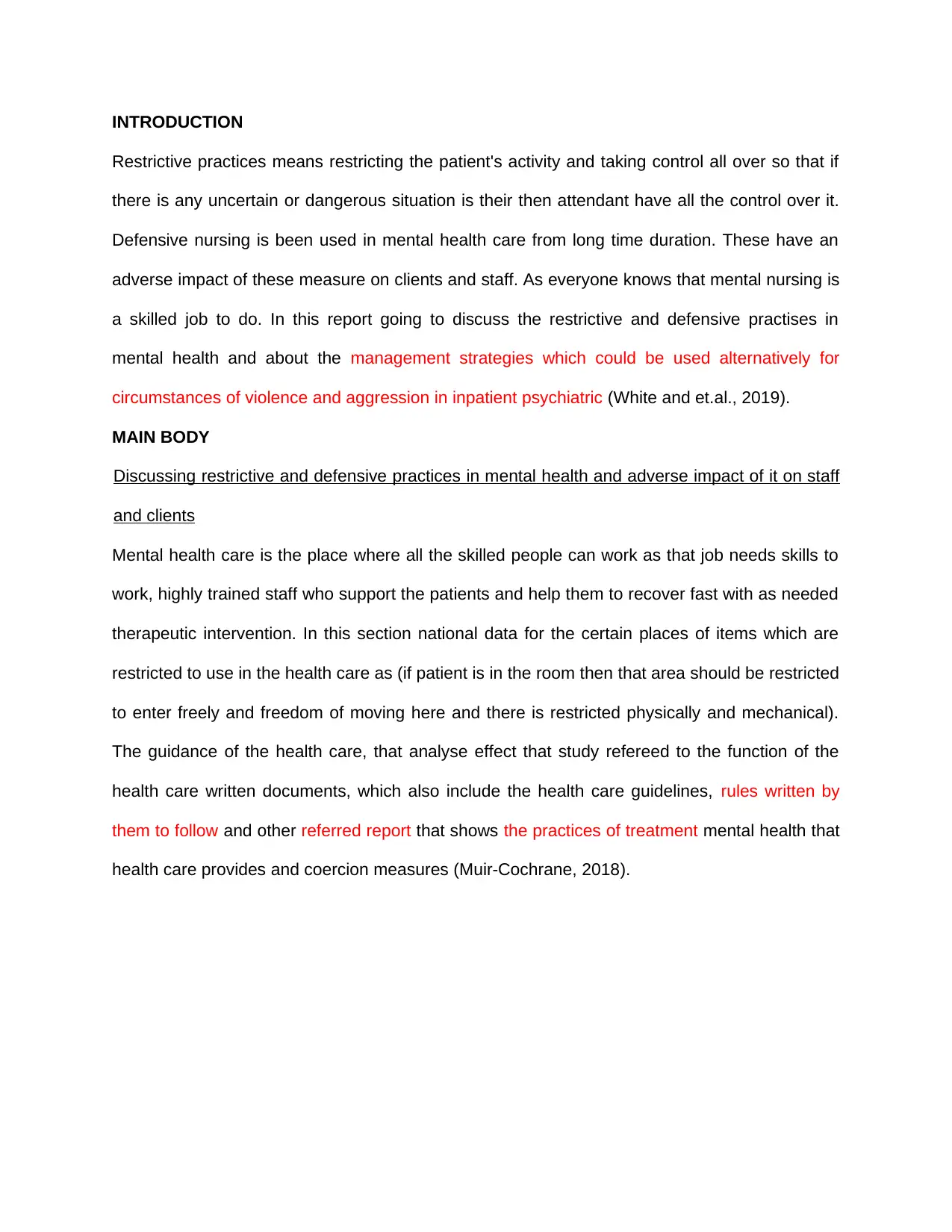
INTRODUCTION
Restrictive practices means restricting the patient's activity and taking control all over so that if
there is any uncertain or dangerous situation is their then attendant have all the control over it.
Defensive nursing is been used in mental health care from long time duration. These have an
adverse impact of these measure on clients and staff. As everyone knows that mental nursing is
a skilled job to do. In this report going to discuss the restrictive and defensive practises in
mental health and about the management strategies which could be used alternatively for
circumstances of violence and aggression in inpatient psychiatric (White and et.al., 2019).
MAIN BODY
Discussing restrictive and defensive practices in mental health and adverse impact of it on staff
and clients
Mental health care is the place where all the skilled people can work as that job needs skills to
work, highly trained staff who support the patients and help them to recover fast with as needed
therapeutic intervention. In this section national data for the certain places of items which are
restricted to use in the health care as (if patient is in the room then that area should be restricted
to enter freely and freedom of moving here and there is restricted physically and mechanical).
The guidance of the health care, that analyse effect that study refereed to the function of the
health care written documents, which also include the health care guidelines, rules written by
them to follow and other referred report that shows the practices of treatment mental health that
health care provides and coercion measures (Muir‐Cochrane, 2018).
Restrictive practices means restricting the patient's activity and taking control all over so that if
there is any uncertain or dangerous situation is their then attendant have all the control over it.
Defensive nursing is been used in mental health care from long time duration. These have an
adverse impact of these measure on clients and staff. As everyone knows that mental nursing is
a skilled job to do. In this report going to discuss the restrictive and defensive practises in
mental health and about the management strategies which could be used alternatively for
circumstances of violence and aggression in inpatient psychiatric (White and et.al., 2019).
MAIN BODY
Discussing restrictive and defensive practices in mental health and adverse impact of it on staff
and clients
Mental health care is the place where all the skilled people can work as that job needs skills to
work, highly trained staff who support the patients and help them to recover fast with as needed
therapeutic intervention. In this section national data for the certain places of items which are
restricted to use in the health care as (if patient is in the room then that area should be restricted
to enter freely and freedom of moving here and there is restricted physically and mechanical).
The guidance of the health care, that analyse effect that study refereed to the function of the
health care written documents, which also include the health care guidelines, rules written by
them to follow and other referred report that shows the practices of treatment mental health that
health care provides and coercion measures (Muir‐Cochrane, 2018).
⊘ This is a preview!⊘
Do you want full access?
Subscribe today to unlock all pages.

Trusted by 1+ million students worldwide
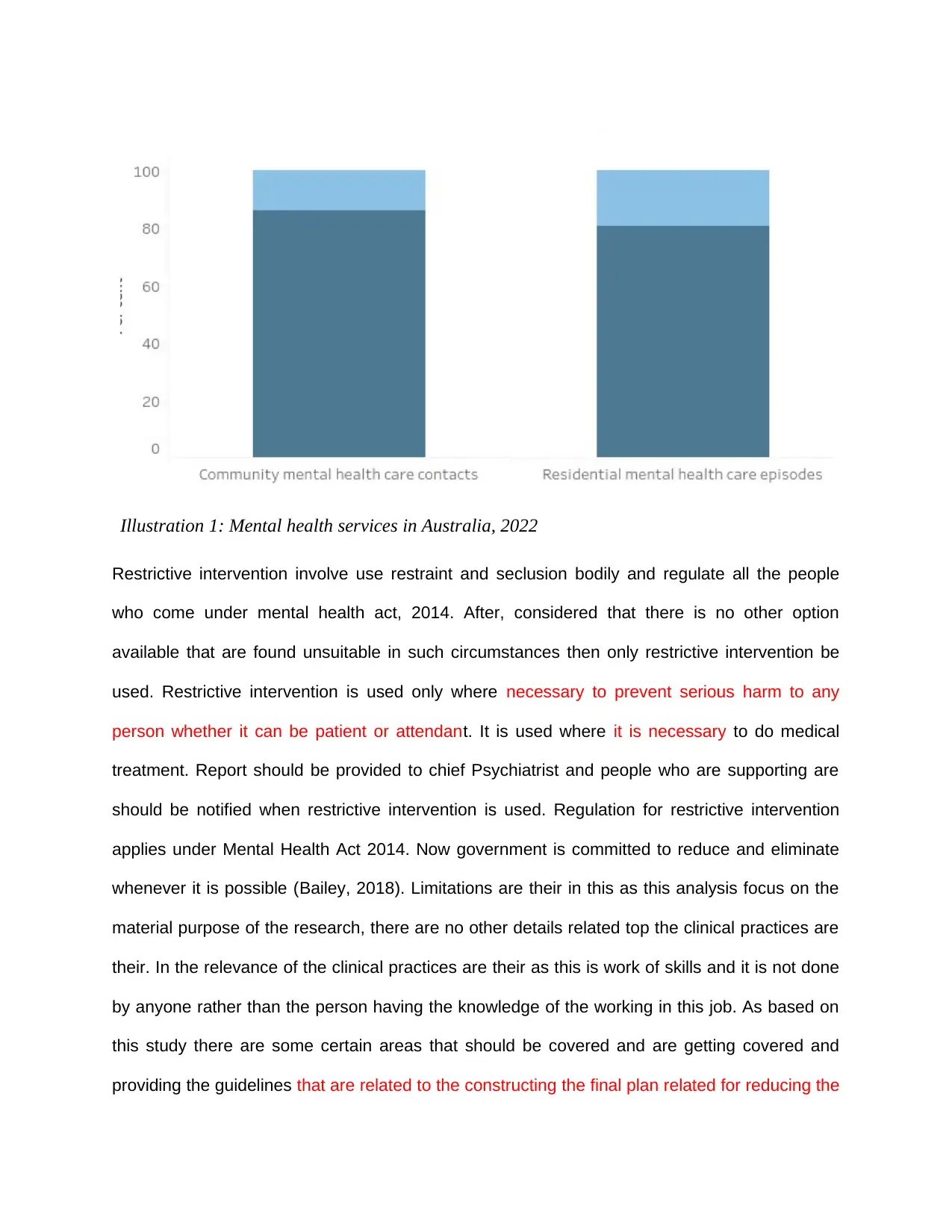
Restrictive intervention involve use restraint and seclusion bodily and regulate all the people
who come under mental health act, 2014. After, considered that there is no other option
available that are found unsuitable in such circumstances then only restrictive intervention be
used. Restrictive intervention is used only where necessary to prevent serious harm to any
person whether it can be patient or attendant. It is used where it is necessary to do medical
treatment. Report should be provided to chief Psychiatrist and people who are supporting are
should be notified when restrictive intervention is used. Regulation for restrictive intervention
applies under Mental Health Act 2014. Now government is committed to reduce and eliminate
whenever it is possible (Bailey, 2018). Limitations are their in this as this analysis focus on the
material purpose of the research, there are no other details related top the clinical practices are
their. In the relevance of the clinical practices are their as this is work of skills and it is not done
by anyone rather than the person having the knowledge of the working in this job. As based on
this study there are some certain areas that should be covered and are getting covered and
providing the guidelines that are related to the constructing the final plan related for reducing the
Illustration 1: Mental health services in Australia, 2022
who come under mental health act, 2014. After, considered that there is no other option
available that are found unsuitable in such circumstances then only restrictive intervention be
used. Restrictive intervention is used only where necessary to prevent serious harm to any
person whether it can be patient or attendant. It is used where it is necessary to do medical
treatment. Report should be provided to chief Psychiatrist and people who are supporting are
should be notified when restrictive intervention is used. Regulation for restrictive intervention
applies under Mental Health Act 2014. Now government is committed to reduce and eliminate
whenever it is possible (Bailey, 2018). Limitations are their in this as this analysis focus on the
material purpose of the research, there are no other details related top the clinical practices are
their. In the relevance of the clinical practices are their as this is work of skills and it is not done
by anyone rather than the person having the knowledge of the working in this job. As based on
this study there are some certain areas that should be covered and are getting covered and
providing the guidelines that are related to the constructing the final plan related for reducing the
Illustration 1: Mental health services in Australia, 2022
Paraphrase This Document
Need a fresh take? Get an instant paraphrase of this document with our AI Paraphraser
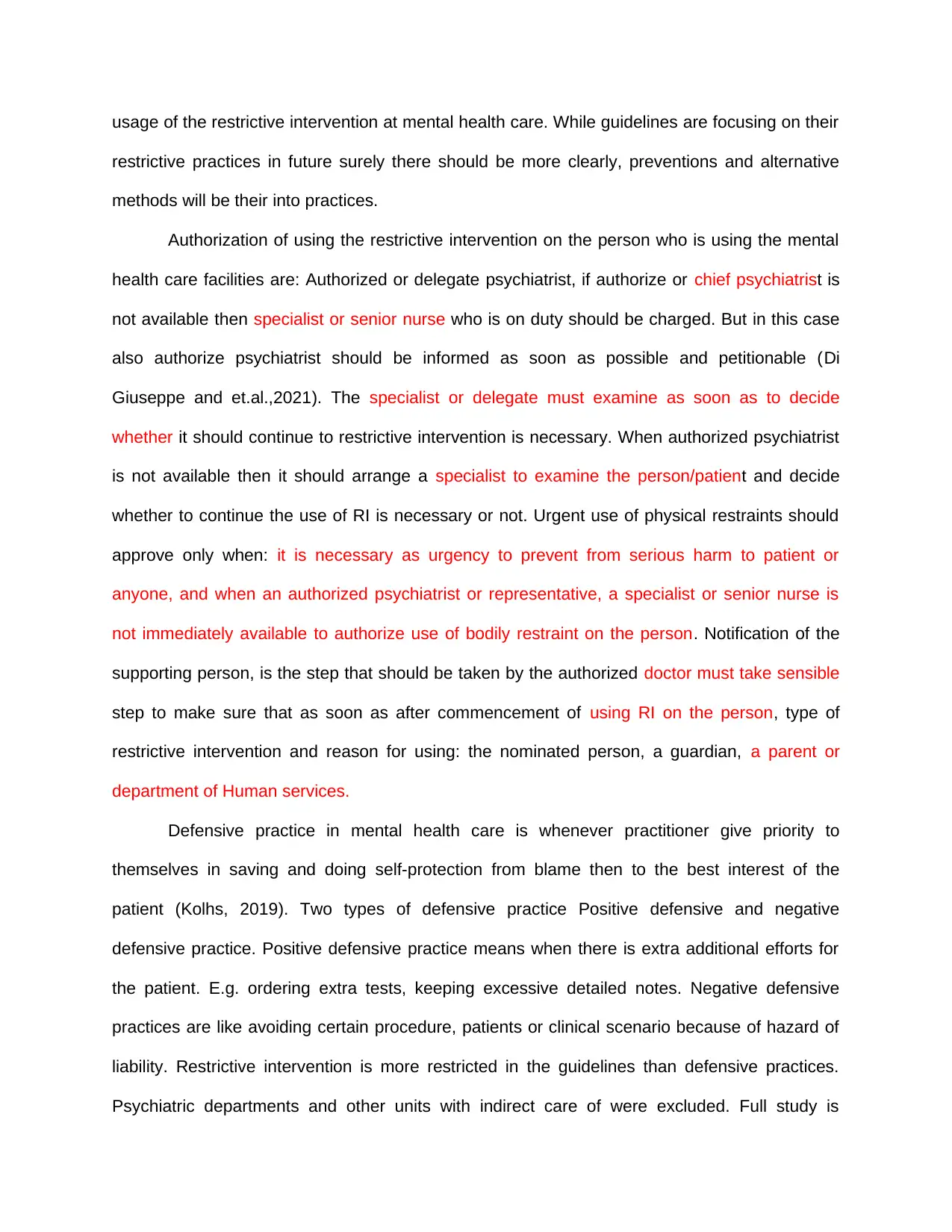
usage of the restrictive intervention at mental health care. While guidelines are focusing on their
restrictive practices in future surely there should be more clearly, preventions and alternative
methods will be their into practices.
Authorization of using the restrictive intervention on the person who is using the mental
health care facilities are: Authorized or delegate psychiatrist, if authorize or chief psychiatrist is
not available then specialist or senior nurse who is on duty should be charged. But in this case
also authorize psychiatrist should be informed as soon as possible and petitionable (Di
Giuseppe and et.al.,2021). The specialist or delegate must examine as soon as to decide
whether it should continue to restrictive intervention is necessary. When authorized psychiatrist
is not available then it should arrange a specialist to examine the person/patient and decide
whether to continue the use of RI is necessary or not. Urgent use of physical restraints should
approve only when: it is necessary as urgency to prevent from serious harm to patient or
anyone, and when an authorized psychiatrist or representative, a specialist or senior nurse is
not immediately available to authorize use of bodily restraint on the person. Notification of the
supporting person, is the step that should be taken by the authorized doctor must take sensible
step to make sure that as soon as after commencement of using RI on the person, type of
restrictive intervention and reason for using: the nominated person, a guardian, a parent or
department of Human services.
Defensive practice in mental health care is whenever practitioner give priority to
themselves in saving and doing self-protection from blame then to the best interest of the
patient (Kolhs, 2019). Two types of defensive practice Positive defensive and negative
defensive practice. Positive defensive practice means when there is extra additional efforts for
the patient. E.g. ordering extra tests, keeping excessive detailed notes. Negative defensive
practices are like avoiding certain procedure, patients or clinical scenario because of hazard of
liability. Restrictive intervention is more restricted in the guidelines than defensive practices.
Psychiatric departments and other units with indirect care of were excluded. Full study is
restrictive practices in future surely there should be more clearly, preventions and alternative
methods will be their into practices.
Authorization of using the restrictive intervention on the person who is using the mental
health care facilities are: Authorized or delegate psychiatrist, if authorize or chief psychiatrist is
not available then specialist or senior nurse who is on duty should be charged. But in this case
also authorize psychiatrist should be informed as soon as possible and petitionable (Di
Giuseppe and et.al.,2021). The specialist or delegate must examine as soon as to decide
whether it should continue to restrictive intervention is necessary. When authorized psychiatrist
is not available then it should arrange a specialist to examine the person/patient and decide
whether to continue the use of RI is necessary or not. Urgent use of physical restraints should
approve only when: it is necessary as urgency to prevent from serious harm to patient or
anyone, and when an authorized psychiatrist or representative, a specialist or senior nurse is
not immediately available to authorize use of bodily restraint on the person. Notification of the
supporting person, is the step that should be taken by the authorized doctor must take sensible
step to make sure that as soon as after commencement of using RI on the person, type of
restrictive intervention and reason for using: the nominated person, a guardian, a parent or
department of Human services.
Defensive practice in mental health care is whenever practitioner give priority to
themselves in saving and doing self-protection from blame then to the best interest of the
patient (Kolhs, 2019). Two types of defensive practice Positive defensive and negative
defensive practice. Positive defensive practice means when there is extra additional efforts for
the patient. E.g. ordering extra tests, keeping excessive detailed notes. Negative defensive
practices are like avoiding certain procedure, patients or clinical scenario because of hazard of
liability. Restrictive intervention is more restricted in the guidelines than defensive practices.
Psychiatric departments and other units with indirect care of were excluded. Full study is
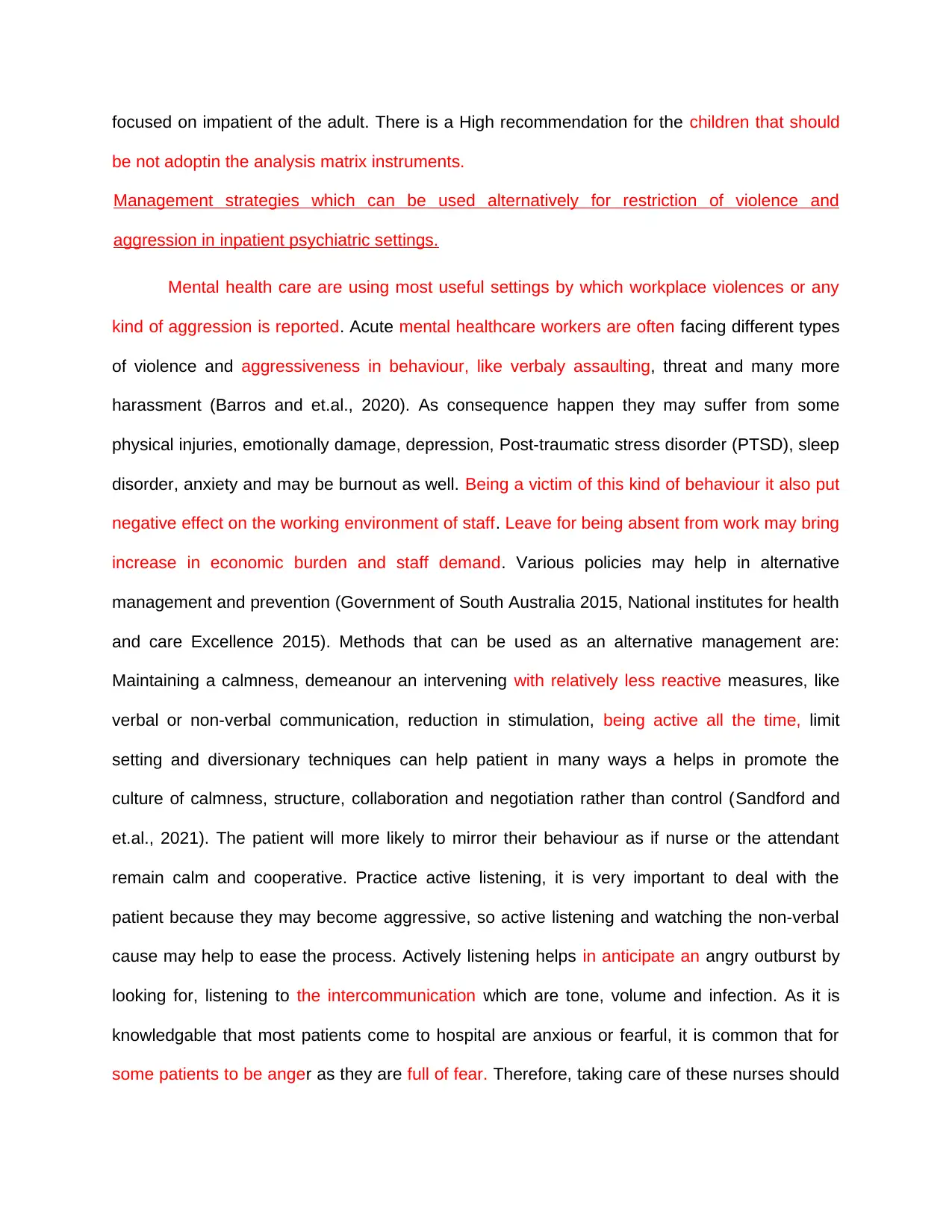
focused on impatient of the adult. There is a High recommendation for the children that should
be not adoptin the analysis matrix instruments.
Management strategies which can be used alternatively for restriction of violence and
aggression in inpatient psychiatric settings.
Mental health care are using most useful settings by which workplace violences or any
kind of aggression is reported. Acute mental healthcare workers are often facing different types
of violence and aggressiveness in behaviour, like verbaly assaulting, threat and many more
harassment (Barros and et.al., 2020). As consequence happen they may suffer from some
physical injuries, emotionally damage, depression, Post-traumatic stress disorder (PTSD), sleep
disorder, anxiety and may be burnout as well. Being a victim of this kind of behaviour it also put
negative effect on the working environment of staff. Leave for being absent from work may bring
increase in economic burden and staff demand. Various policies may help in alternative
management and prevention (Government of South Australia 2015, National institutes for health
and care Excellence 2015). Methods that can be used as an alternative management are:
Maintaining a calmness, demeanour an intervening with relatively less reactive measures, like
verbal or non-verbal communication, reduction in stimulation, being active all the time, limit
setting and diversionary techniques can help patient in many ways a helps in promote the
culture of calmness, structure, collaboration and negotiation rather than control (Sandford and
et.al., 2021). The patient will more likely to mirror their behaviour as if nurse or the attendant
remain calm and cooperative. Practice active listening, it is very important to deal with the
patient because they may become aggressive, so active listening and watching the non-verbal
cause may help to ease the process. Actively listening helps in anticipate an angry outburst by
looking for, listening to the intercommunication which are tone, volume and infection. As it is
knowledgable that most patients come to hospital are anxious or fearful, it is common that for
some patients to be anger as they are full of fear. Therefore, taking care of these nurses should
be not adoptin the analysis matrix instruments.
Management strategies which can be used alternatively for restriction of violence and
aggression in inpatient psychiatric settings.
Mental health care are using most useful settings by which workplace violences or any
kind of aggression is reported. Acute mental healthcare workers are often facing different types
of violence and aggressiveness in behaviour, like verbaly assaulting, threat and many more
harassment (Barros and et.al., 2020). As consequence happen they may suffer from some
physical injuries, emotionally damage, depression, Post-traumatic stress disorder (PTSD), sleep
disorder, anxiety and may be burnout as well. Being a victim of this kind of behaviour it also put
negative effect on the working environment of staff. Leave for being absent from work may bring
increase in economic burden and staff demand. Various policies may help in alternative
management and prevention (Government of South Australia 2015, National institutes for health
and care Excellence 2015). Methods that can be used as an alternative management are:
Maintaining a calmness, demeanour an intervening with relatively less reactive measures, like
verbal or non-verbal communication, reduction in stimulation, being active all the time, limit
setting and diversionary techniques can help patient in many ways a helps in promote the
culture of calmness, structure, collaboration and negotiation rather than control (Sandford and
et.al., 2021). The patient will more likely to mirror their behaviour as if nurse or the attendant
remain calm and cooperative. Practice active listening, it is very important to deal with the
patient because they may become aggressive, so active listening and watching the non-verbal
cause may help to ease the process. Actively listening helps in anticipate an angry outburst by
looking for, listening to the intercommunication which are tone, volume and infection. As it is
knowledgable that most patients come to hospital are anxious or fearful, it is common that for
some patients to be anger as they are full of fear. Therefore, taking care of these nurses should
⊘ This is a preview!⊘
Do you want full access?
Subscribe today to unlock all pages.

Trusted by 1+ million students worldwide
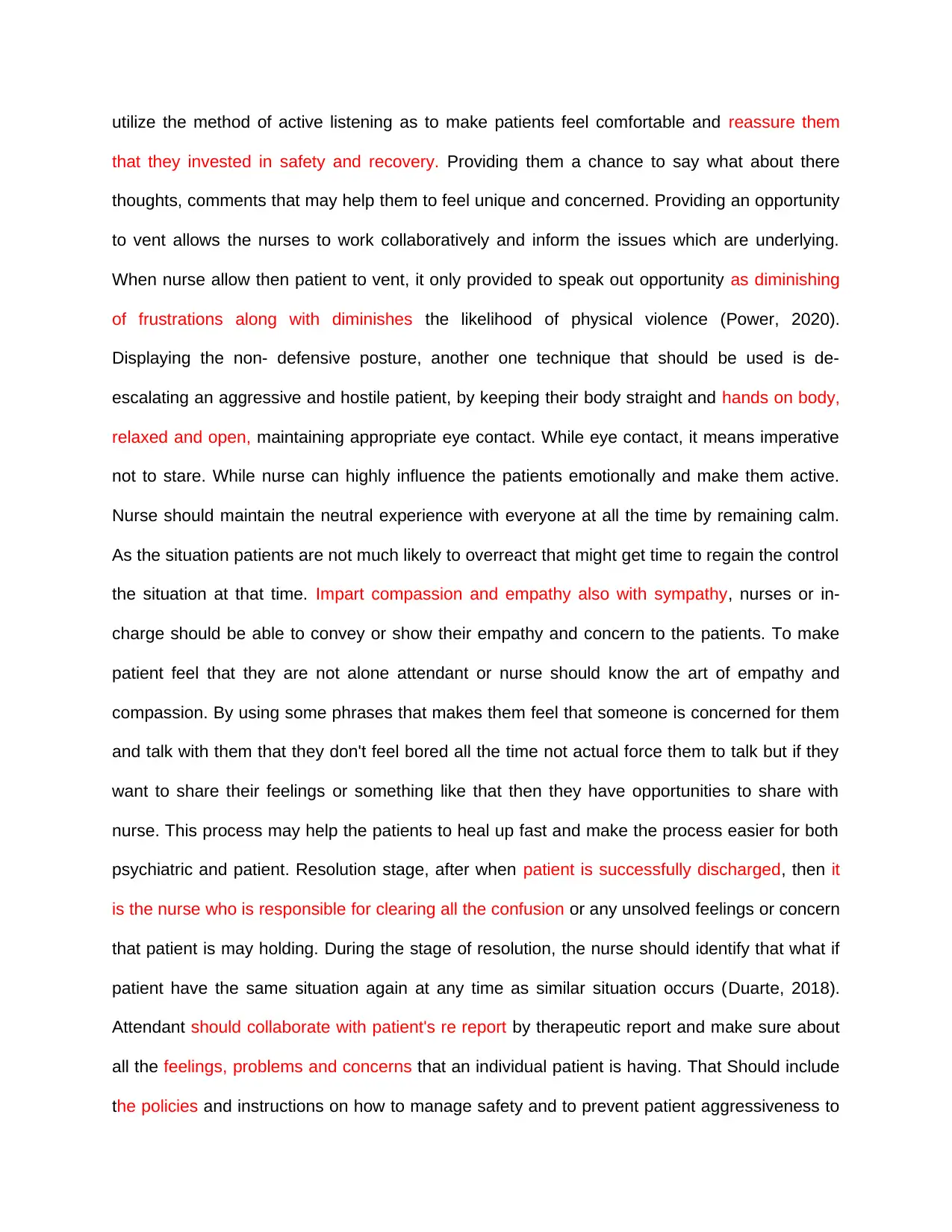
utilize the method of active listening as to make patients feel comfortable and reassure them
that they invested in safety and recovery. Providing them a chance to say what about there
thoughts, comments that may help them to feel unique and concerned. Providing an opportunity
to vent allows the nurses to work collaboratively and inform the issues which are underlying.
When nurse allow then patient to vent, it only provided to speak out opportunity as diminishing
of frustrations along with diminishes the likelihood of physical violence (Power, 2020).
Displaying the non- defensive posture, another one technique that should be used is de-
escalating an aggressive and hostile patient, by keeping their body straight and hands on body,
relaxed and open, maintaining appropriate eye contact. While eye contact, it means imperative
not to stare. While nurse can highly influence the patients emotionally and make them active.
Nurse should maintain the neutral experience with everyone at all the time by remaining calm.
As the situation patients are not much likely to overreact that might get time to regain the control
the situation at that time. Impart compassion and empathy also with sympathy, nurses or in-
charge should be able to convey or show their empathy and concern to the patients. To make
patient feel that they are not alone attendant or nurse should know the art of empathy and
compassion. By using some phrases that makes them feel that someone is concerned for them
and talk with them that they don't feel bored all the time not actual force them to talk but if they
want to share their feelings or something like that then they have opportunities to share with
nurse. This process may help the patients to heal up fast and make the process easier for both
psychiatric and patient. Resolution stage, after when patient is successfully discharged, then it
is the nurse who is responsible for clearing all the confusion or any unsolved feelings or concern
that patient is may holding. During the stage of resolution, the nurse should identify that what if
patient have the same situation again at any time as similar situation occurs (Duarte, 2018).
Attendant should collaborate with patient's re report by therapeutic report and make sure about
all the feelings, problems and concerns that an individual patient is having. That Should include
the policies and instructions on how to manage safety and to prevent patient aggressiveness to
that they invested in safety and recovery. Providing them a chance to say what about there
thoughts, comments that may help them to feel unique and concerned. Providing an opportunity
to vent allows the nurses to work collaboratively and inform the issues which are underlying.
When nurse allow then patient to vent, it only provided to speak out opportunity as diminishing
of frustrations along with diminishes the likelihood of physical violence (Power, 2020).
Displaying the non- defensive posture, another one technique that should be used is de-
escalating an aggressive and hostile patient, by keeping their body straight and hands on body,
relaxed and open, maintaining appropriate eye contact. While eye contact, it means imperative
not to stare. While nurse can highly influence the patients emotionally and make them active.
Nurse should maintain the neutral experience with everyone at all the time by remaining calm.
As the situation patients are not much likely to overreact that might get time to regain the control
the situation at that time. Impart compassion and empathy also with sympathy, nurses or in-
charge should be able to convey or show their empathy and concern to the patients. To make
patient feel that they are not alone attendant or nurse should know the art of empathy and
compassion. By using some phrases that makes them feel that someone is concerned for them
and talk with them that they don't feel bored all the time not actual force them to talk but if they
want to share their feelings or something like that then they have opportunities to share with
nurse. This process may help the patients to heal up fast and make the process easier for both
psychiatric and patient. Resolution stage, after when patient is successfully discharged, then it
is the nurse who is responsible for clearing all the confusion or any unsolved feelings or concern
that patient is may holding. During the stage of resolution, the nurse should identify that what if
patient have the same situation again at any time as similar situation occurs (Duarte, 2018).
Attendant should collaborate with patient's re report by therapeutic report and make sure about
all the feelings, problems and concerns that an individual patient is having. That Should include
the policies and instructions on how to manage safety and to prevent patient aggressiveness to
Paraphrase This Document
Need a fresh take? Get an instant paraphrase of this document with our AI Paraphraser
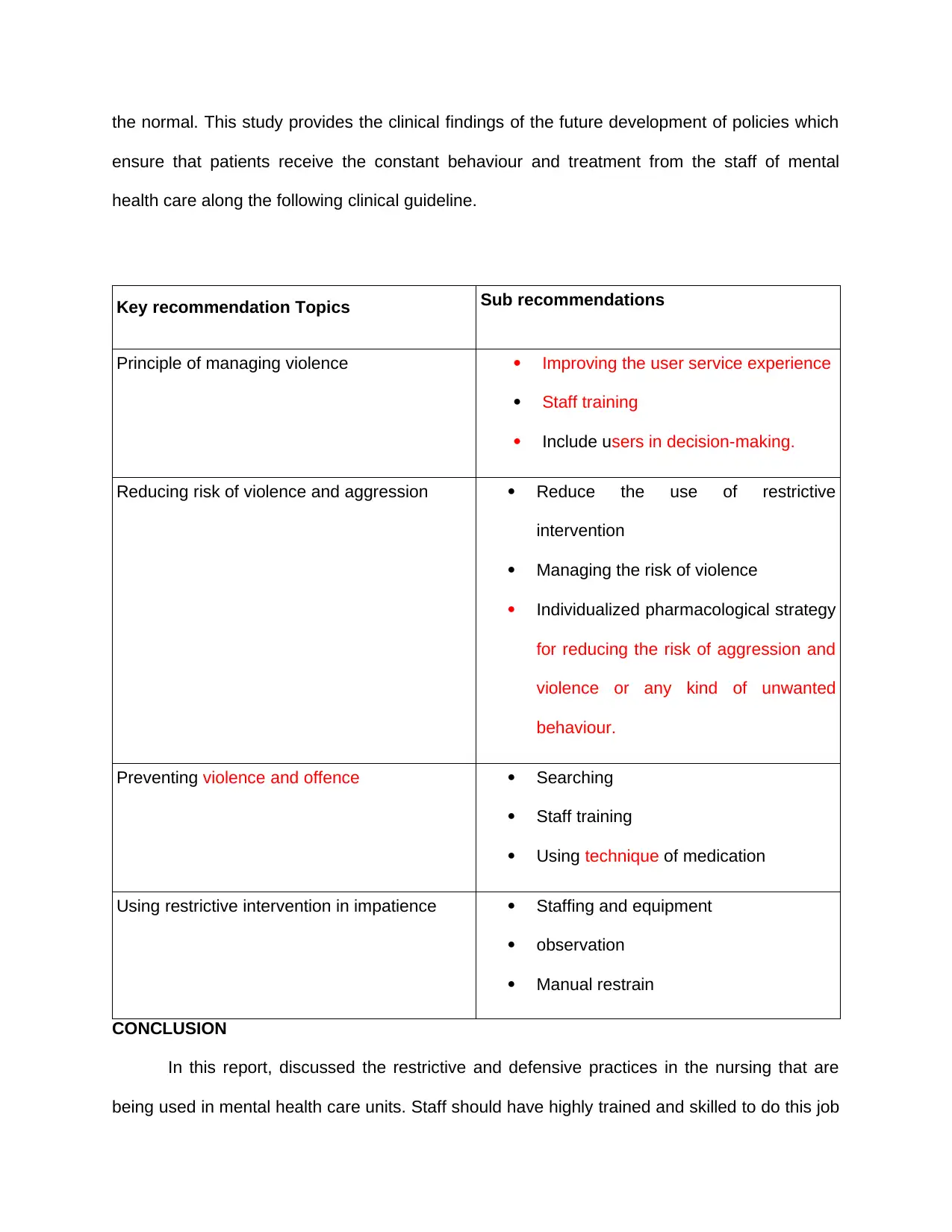
the normal. This study provides the clinical findings of the future development of policies which
ensure that patients receive the constant behaviour and treatment from the staff of mental
health care along the following clinical guideline.
Key recommendation Topics Sub recommendations
Principle of managing violence Improving the user service experience
Staff training
Include users in decision-making.
Reducing risk of violence and aggression Reduce the use of restrictive
intervention
Managing the risk of violence
Individualized pharmacological strategy
for reducing the risk of aggression and
violence or any kind of unwanted
behaviour.
Preventing violence and offence Searching
Staff training
Using technique of medication
Using restrictive intervention in impatience Staffing and equipment
observation
Manual restrain
CONCLUSION
In this report, discussed the restrictive and defensive practices in the nursing that are
being used in mental health care units. Staff should have highly trained and skilled to do this job
ensure that patients receive the constant behaviour and treatment from the staff of mental
health care along the following clinical guideline.
Key recommendation Topics Sub recommendations
Principle of managing violence Improving the user service experience
Staff training
Include users in decision-making.
Reducing risk of violence and aggression Reduce the use of restrictive
intervention
Managing the risk of violence
Individualized pharmacological strategy
for reducing the risk of aggression and
violence or any kind of unwanted
behaviour.
Preventing violence and offence Searching
Staff training
Using technique of medication
Using restrictive intervention in impatience Staffing and equipment
observation
Manual restrain
CONCLUSION
In this report, discussed the restrictive and defensive practices in the nursing that are
being used in mental health care units. Staff should have highly trained and skilled to do this job
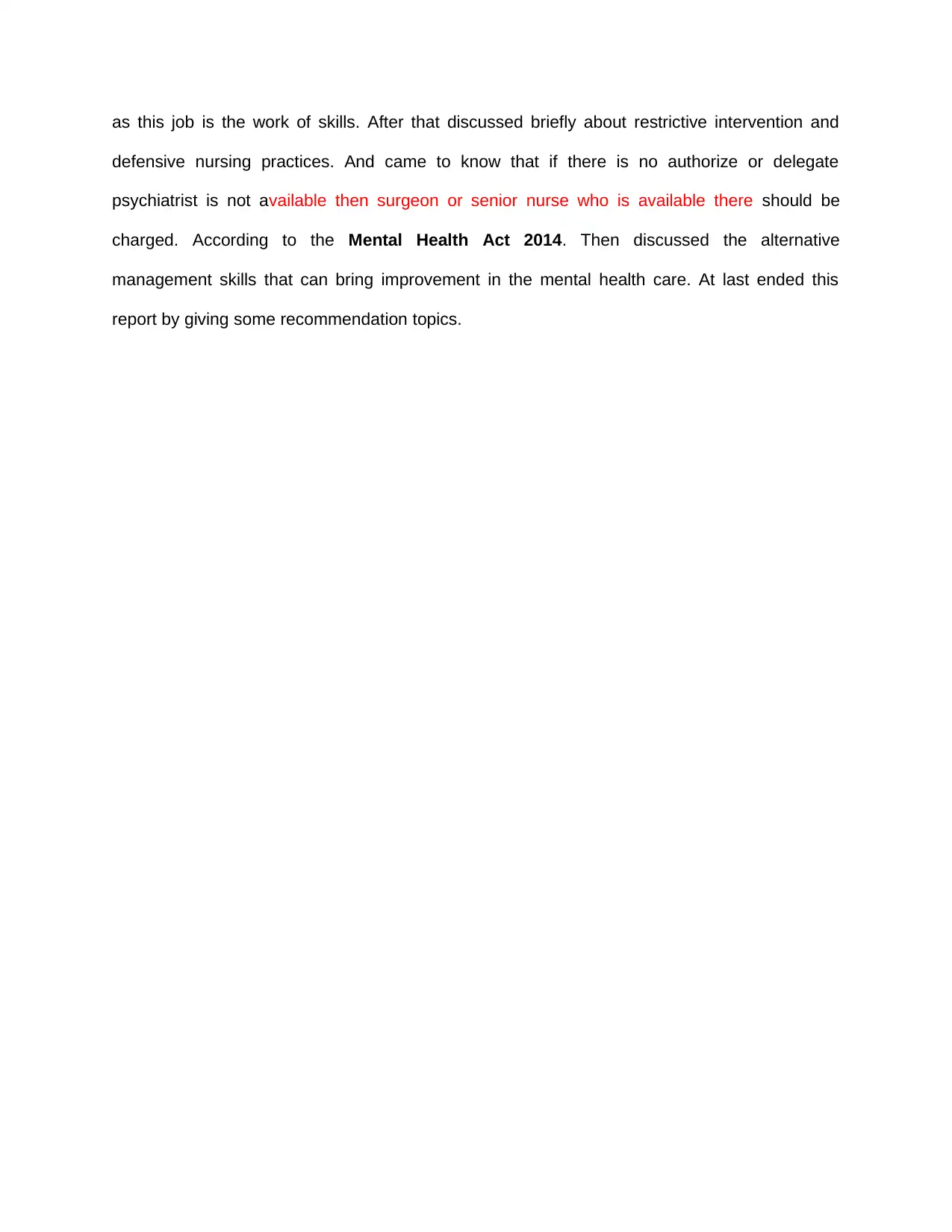
as this job is the work of skills. After that discussed briefly about restrictive intervention and
defensive nursing practices. And came to know that if there is no authorize or delegate
psychiatrist is not available then surgeon or senior nurse who is available there should be
charged. According to the Mental Health Act 2014. Then discussed the alternative
management skills that can bring improvement in the mental health care. At last ended this
report by giving some recommendation topics.
defensive nursing practices. And came to know that if there is no authorize or delegate
psychiatrist is not available then surgeon or senior nurse who is available there should be
charged. According to the Mental Health Act 2014. Then discussed the alternative
management skills that can bring improvement in the mental health care. At last ended this
report by giving some recommendation topics.
⊘ This is a preview!⊘
Do you want full access?
Subscribe today to unlock all pages.

Trusted by 1+ million students worldwide
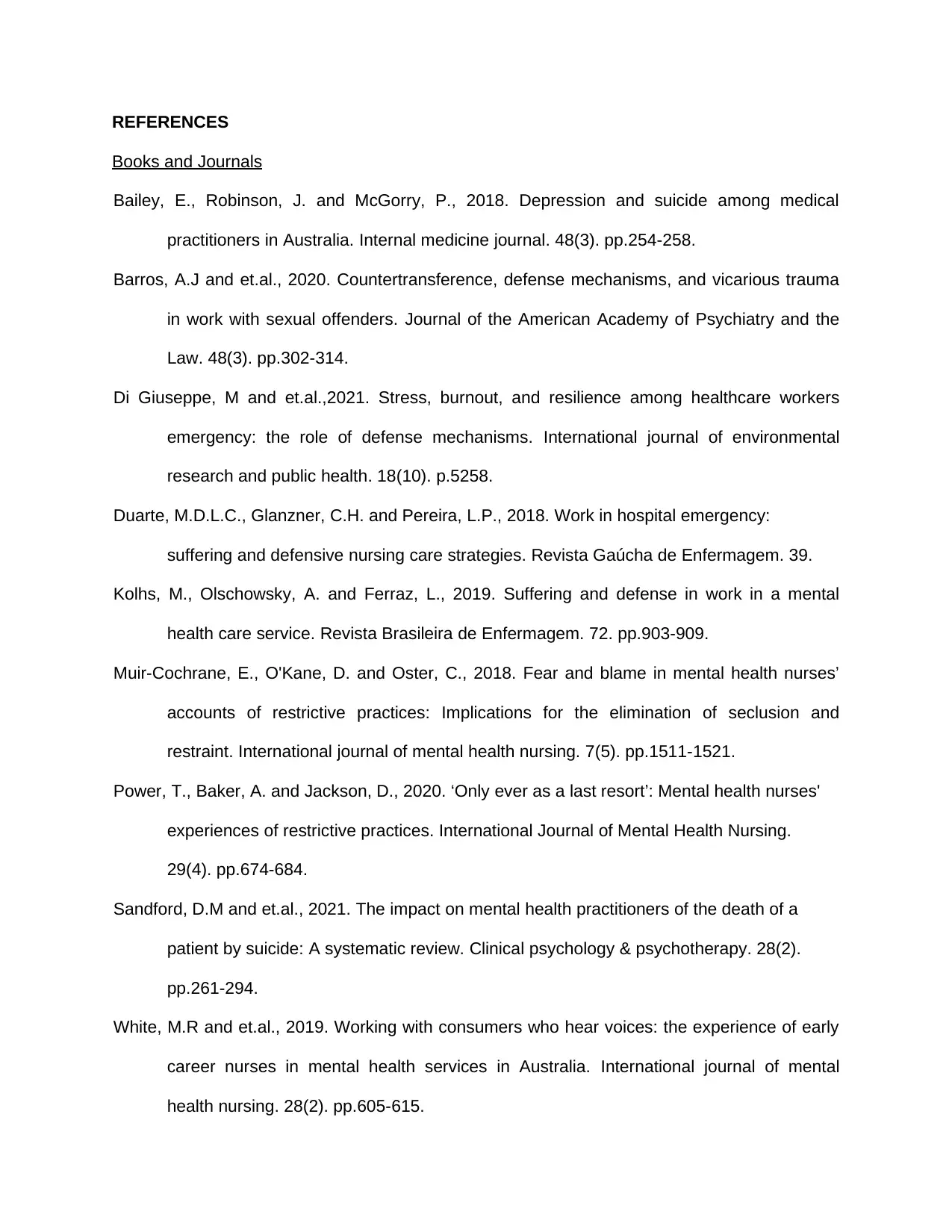
REFERENCES
Books and Journals
Bailey, E., Robinson, J. and McGorry, P., 2018. Depression and suicide among medical
practitioners in Australia. Internal medicine journal. 48(3). pp.254-258.
Barros, A.J and et.al., 2020. Countertransference, defense mechanisms, and vicarious trauma
in work with sexual offenders. Journal of the American Academy of Psychiatry and the
Law. 48(3). pp.302-314.
Di Giuseppe, M and et.al.,2021. Stress, burnout, and resilience among healthcare workers
emergency: the role of defense mechanisms. International journal of environmental
research and public health. 18(10). p.5258.
Duarte, M.D.L.C., Glanzner, C.H. and Pereira, L.P., 2018. Work in hospital emergency:
suffering and defensive nursing care strategies. Revista Gaúcha de Enfermagem. 39.
Kolhs, M., Olschowsky, A. and Ferraz, L., 2019. Suffering and defense in work in a mental
health care service. Revista Brasileira de Enfermagem. 72. pp.903-909.
Muir‐Cochrane, E., O'Kane, D. and Oster, C., 2018. Fear and blame in mental health nurses’
accounts of restrictive practices: Implications for the elimination of seclusion and
restraint. International journal of mental health nursing. 7(5). pp.1511-1521.
Power, T., Baker, A. and Jackson, D., 2020. ‘Only ever as a last resort’: Mental health nurses'
experiences of restrictive practices. International Journal of Mental Health Nursing.
29(4). pp.674-684.
Sandford, D.M and et.al., 2021. The impact on mental health practitioners of the death of a
patient by suicide: A systematic review. Clinical psychology & psychotherapy. 28(2).
pp.261-294.
White, M.R and et.al., 2019. Working with consumers who hear voices: the experience of early
career nurses in mental health services in Australia. International journal of mental
health nursing. 28(2). pp.605-615.
Books and Journals
Bailey, E., Robinson, J. and McGorry, P., 2018. Depression and suicide among medical
practitioners in Australia. Internal medicine journal. 48(3). pp.254-258.
Barros, A.J and et.al., 2020. Countertransference, defense mechanisms, and vicarious trauma
in work with sexual offenders. Journal of the American Academy of Psychiatry and the
Law. 48(3). pp.302-314.
Di Giuseppe, M and et.al.,2021. Stress, burnout, and resilience among healthcare workers
emergency: the role of defense mechanisms. International journal of environmental
research and public health. 18(10). p.5258.
Duarte, M.D.L.C., Glanzner, C.H. and Pereira, L.P., 2018. Work in hospital emergency:
suffering and defensive nursing care strategies. Revista Gaúcha de Enfermagem. 39.
Kolhs, M., Olschowsky, A. and Ferraz, L., 2019. Suffering and defense in work in a mental
health care service. Revista Brasileira de Enfermagem. 72. pp.903-909.
Muir‐Cochrane, E., O'Kane, D. and Oster, C., 2018. Fear and blame in mental health nurses’
accounts of restrictive practices: Implications for the elimination of seclusion and
restraint. International journal of mental health nursing. 7(5). pp.1511-1521.
Power, T., Baker, A. and Jackson, D., 2020. ‘Only ever as a last resort’: Mental health nurses'
experiences of restrictive practices. International Journal of Mental Health Nursing.
29(4). pp.674-684.
Sandford, D.M and et.al., 2021. The impact on mental health practitioners of the death of a
patient by suicide: A systematic review. Clinical psychology & psychotherapy. 28(2).
pp.261-294.
White, M.R and et.al., 2019. Working with consumers who hear voices: the experience of early
career nurses in mental health services in Australia. International journal of mental
health nursing. 28(2). pp.605-615.
1 out of 10
Related Documents
Your All-in-One AI-Powered Toolkit for Academic Success.
+13062052269
info@desklib.com
Available 24*7 on WhatsApp / Email
![[object Object]](/_next/static/media/star-bottom.7253800d.svg)
Unlock your academic potential
Copyright © 2020–2025 A2Z Services. All Rights Reserved. Developed and managed by ZUCOL.





